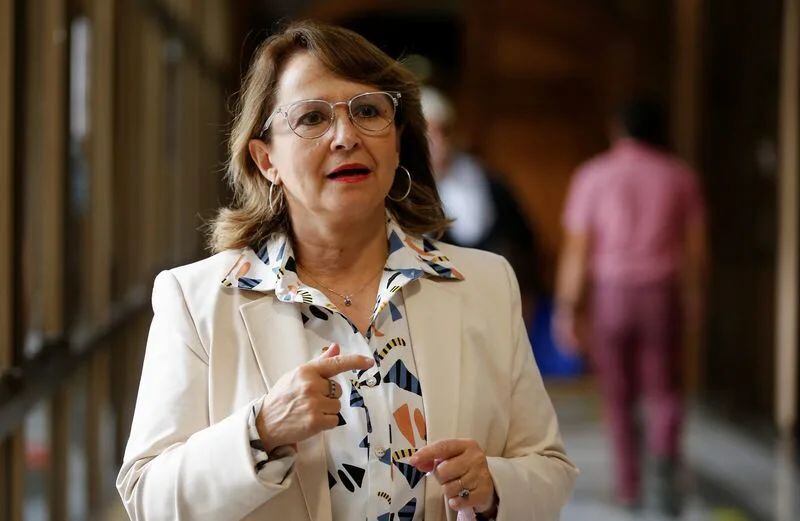
The Chilean Minister of Mining, Marcela Hernando, said that the national strategy of the lithium recently announced by your government does not seek to nationalize the mineral -“it has been since the dictatorship”-, and that the objective, beyond the country recovering its leading position, is to increase production “because the world needs it”.
“Are we interested in being leaders? Of course it is, but what interests us most is that it produce more lithiumbecause the world needs it. Obviously we are also interested in placing it well in the markets”, indicated Hernando in an interview with EFE.
Chile, the country with the most exploitable reserves in the world, is the world’s second largest producer of lithium (and the first copper), behind Australia, but Argentina follows closely and could overtake it in the coming years.
According to a report from the US bank JPMorgan last February, in 2030 Argentine production would exceed that of Chile.
“As a State, we have taken a long time to react, to investigate. We have 9.6 million metric tons in the Salar de Atacama, but we have another 45 salt flats in which we do not know how much reserve there is.”, acknowledged the minister.
“International pressures”
Chilean President Gabriel Boric announced at the end of April his long-awaited lithium policy, which seeks to turn the State into the main promoter and controller of the industry through a public-private model and a national company.
Today, only two private companies exploit lithium in the Salar de Atacama, which concentrates 90% of the country’s reserves: the American Albemarle and Sociedad Química y Minera SQM, controlled by China. tianqi and the son-in-law of former dictator Augusto Pinochet (1973-1990), Julio Ponce Lerou.
In 2022, Chile exported US$ 6,877 million of lithium carbonate, which represents an increase of 777% compared to 2021, according to the Central Bank.
The strategy received a barrage of criticism from the industry, which Hernando blamed on the “huge interests” that awakens lithium, known as the “White gold” for its massive use in batteries and its enormous potential for electromobility.
“There are also geopolitical reasons and international pressures. We are a very small country but with a very open economy and we are subject to this type of pressure”, stressed the minister, who was a deputy in two terms and mayoress of northern Antofagasta, the capital of the powerful Chilean mining industry.
The state-owned Codelco -the largest copper company in the world- and enami They will be in charge of implementing the first phase of the strategy until the national lithium company begins to operate, whose creation has to be approved by Parliament, where the Government does not have a majority but arrives with the intention of “dialogue”, according to Hernando.
“It was made to understand that this was a nationalization. The truth is that only what is private is nationalized. Here the lithium it is declared a non-concessible strategic element in the Constitution of 1980, that is, it is property of the State and the State is the one that decides”, clarified the official.
“Nor are we intervening in the contracts that exist with the two private companies that operate it. What we are doing is setting the rules so that there is a good use of this resource.”, added Hernando, who gave the interview days after the approval by a large majority of a tax on large-scale mining that aims to collect 0.45 of GDP.
more sustainable techniques
The lithium boom is of particular concern to environmentalists because of the enormous amount of water needed for its exploitation and because Chili It is the country with the highest water stress on the continent: it is estimated that each tonne requires the evaporation of two million liters of water.
The minister explained that the objective is “migrate towards more sustainable techniques” and that the strategy establishes that any company that wants to participate in this industry must do so through direct extraction and not through evaporation.
“We can’t keep evaporating the water. The method is also inefficient because it fails to extract more than 60% of the lithium from the brine.he declared.
Another of the great challenges that Chili ahead is to prevent lithium from becoming a new nitrate and the industry from being merely extractivist.
“Australia mines lithium from rock and exports concentrate, which is mainly processed in China. What interests us is leaving the added value in Chile”, highlighted Hernando, who assured that there are fifty companies from 12 countries that have already contacted the Government and that are interested in participating in different stages of the production chain.
The global demand is so great, he warned, that “Even if all the projects planned in Argentina were to start up and Bolivia started to produce (the three countries make up what is known as the “lithium triangle”), we would not be able to satisfy it.”.
Source: Gestion
Ricardo is a renowned author and journalist, known for his exceptional writing on top-news stories. He currently works as a writer at the 247 News Agency, where he is known for his ability to deliver breaking news and insightful analysis on the most pressing issues of the day.












